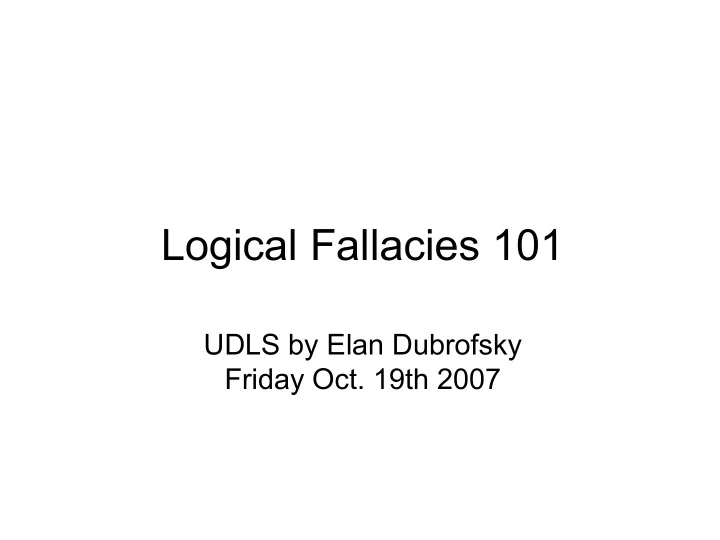

Logical Fallacies 101 UDLS by Elan Dubrofsky Friday Oct. 19th 2007
Introduction ●Arguing is fun.
What is an argument? ●A bunch of premises and a conclusion
What is an argument? ●A bunch of premises and a conclusion 1.A great hockey team needs a great goalie. 2.Ray Emery rules 3.Leadership is important 4.Daniel Alfredsson is the greatest captain of all time. 5.Elan doesn't cheer for loser teams THEREFORE:
What is an argument? ●A bunch of premises and a conclusion 1.A great hockey team needs a great goalie. 2.Ray Emery rules 3.Leadership is important 4.Daniel Alfredsson is the greatest captain of all time. 5.Elan doesn't cheer for loser teams THEREFORE: The Ottawa Senators are best hockey team of all time
WHAT A PAIR!
Validity vs. Soundness ●A valid argument is one in which its premises logically lead to its conclusion. ●A sound argument is one that is valid AND its premises are all true.
Soundness shmoundness I'm only going to consider if an argument is valid. 1.EMT is really smart 2.Smart people are good grad students Therefore: EMT is a good grad student Valid but not sound
What's a logical fallacy? ●An error in reasoning. ●Your premises don't lead logically to your conclusion. There are lots of different types of logical fallacies.
HERE WE GO!
Ad Hominem ●Attack against a person. ●Argument is rejected based on an irrelevant fact about the author. "Einstein's theories are useless; he didn't even know how to dress!" "How can you call yourself a credible witness? You once cheated on your girlfriend!"
Appeal to authority ●Stating your source as beyond reproach. ●The person in question is not a legitimate authority on the subject. "I know the world is only 6000 years old because the pope said so" CELEBRITY ENDORSEMENTS!
Appeal to Emotion ●Manipulating someone's emotions to convince them that your claim is true. "As a mother I care about my kids. So I buy them cheerios." "Taking this vitamin will cause you to lose weight, gain confidence and find the girl of your dreams!"
Strawman ●Exaggerating the opposing idea "Euthanasia should be legal" "So I suppose you support killing any old and sick person?" "Marijuana should be legalized" "I guess you also think that we should sell cocaine to children from ice cream trucks?"
False Correlation (Post Hoc) ●Assuming that if two things occur at (or close to) the same time then one is the cause of the other. "I prayed for money and I found $20. My prayer was answered!" NOTE: We don't remember non events "I was wearing a pink shirt the last time I won playing settlers. So now it's my lucky settlers shirt!"
False Correlation (Post Hoc)
Appeal to Majority ●Saying a claim is true just because it is popular. "Windows is the best operating system. Everybody uses it!" "50,000 smokers can't be wrong!" "Everybody loves Raymond"
Appeal to Ignorance ●Reaching a conclusion because the information isn't known. "I heard a ghost in my bedroom" "Are you sure?" "What else could it have been?" "I think Fred is the murderer" "How do you know" "Well how do you know he ISN'T the killer"
False Dilemma ●Saying you have only 1 of 2 choices. ●In most situations there are more than two possible outcomes. "If we don't stop driving our planet is doomed" ○Maybe we'll come up with an alternative to gasoline? ○Maybe we'll stop driving and then a big meteor will hit earth. ○Maybe EMT's thesis will doom the planet (see Terminator 2) "That person who cut me off is either stupid or on the phone" ○Or he had a heart attack ○Maybe he's stupid AND on the phone! ○Maybe I'm the jerk for driving too slow ○Maybe he made a mistake and would apologize
Fallacy of Division ●Assuming what is true of the whole is true of its parts. "Human beings are made of atoms. Human beings are conscious. Therefore, atoms are conscious. "UBC is a tremendous university. I go to UBC... so I'm tremendous!" (This one is actually true)
Selective Observation ●This is cherry picking only data that supports your argument. "This study shows that cell phones cause cancer" "The bible says, 'Do unto others as you would have them do unto you'" ●Related to false correlation. We only remember the times that the horoscope was right. (My horoscope: "You will embarrass yourself in front of your peers")
THERE ARE SO MANY MORE 1. Ad Hominem 2. Ad Hominem Tu Quoque 3. Appeal to Authority 4. Appeal to Belief 5. Appeal to Common Practice 6. Appeal to Consequences of a Belief 7. Appeal to Emotion 8. Appeal to Fear 9. Appeal to Flattery 10. Appeal to Novelty 11. Appeal to Pity 12. Appeal to Popularity 13. Appeal to Ridicule Now lets go through all of these 14. Appeal to Spite 15. Appeal to Traditio n in excruciating detail. 16. Bandwagon 17. Begging the Question 18. Biased Sample 19. Burden of Proof 20. Circumstantial Ad Hominem 21. Composition 22. Confusing Cause and Effect 23. Division 24. False Dilemma 25. Gambler's Fallacy 26. Genetic Fallacy 27. Guilt By Association 28. Hasty Generalization 29. Ignoring A Common Cause 30. Middle Ground 31. Misleading Vividness 32. Personal Attack 33. Poisoning the Well 34. Post Hoc 35. Questionable Cause 36. Red Herring 37. Relativist Fallacy 38. Slippery Slope 39. Special Pleading 40. Spotlight 41. Straw Man 42. Two Wrongs Make A Right
Conclusion When in an argument, feel free to make up your facts. But at least be logical about it!
Recommend
More recommend